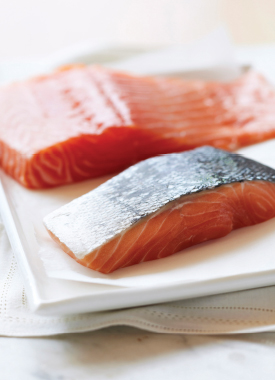Wild for salmon
This article was originally published in June 2015

Like blackberries, apples and other foods emblematic of our region, wild salmon have a fresh season — and it’s happening right now. This month and all through the summer and early fall, you’ll find fresh, wild, Alaskan salmon in our seafood cases. Sockeye and King arrive earlier in the season, Coho later.
Chefs’ cooking tips
Salmon’s distinct flavor and color make any meal seem luxurious (see the recipes page for inspiration). Even the simplest preparations are sublime — after all, nothing beats a fillet grilled to perfection, seasoned with just a shake of salt and pepper, some fresh dill and a squeeze of lemon.
The flavor of wild salmon depends upon fat content and the environment where it matured. Alaska’s icy, pure waters and the abundance of natural food give Alaska salmon unparalleled flavor. The fat content of salmon depends not only on the genetic makeup of each species, but also on its spawning cycle. The longer and more vigorous the freshwater trip, the more fat the fish carries upstream from the ocean.
- Chinook (King) salmon has the highest fat content of the species. Chef Becky Selengut says, “Because of its higher fat content, King salmon is great for high-heat cooking methods, such as grilling, broiling or roasting.”
- Sockeye (Red) salmon has slightly less fat than King. Its full flavor and firm texture hold up well in any cooking preparation, but PCC chef Jackie Freeman prefers to poach it, “to prevent moisture loss and overcooking.”
- Coho (Silver) salmon is leaner than King and S ockeye. Chef Becky Selengut says, “Coho is a wonderful species of salmon because it has a good amount of flavor and some richness. I tend not to use high-heat cooking methods with Coho because of its slightly leaner profile — instead, steaming, poaching or wrapping in parchment are great.”
Sustainable wild Alaskan salmon
Wild salmon from Alaska is considered a “Best Choice” by Seafood Watch and is certified sustainable by the Marine Stewardship Council .
Effective, precise management mandated by law assures Alaska’s salmon fisheries are productive, sustainable, clean and healthy. Strict quotas are enforced to ensure the fishery is sustainable for future generations.
No farmed salmon
“Atlantic” salmon is synonymous with farmed. You’ll never find Atlantic salmon at PCC — we sell only wild Pacific salmon. Farmed salmon have 16 times the amount of PCB chemical contaminants as wild salmon and have terrible environmental effects.
Wild salmon for good health
Salmon are a rich source of beneficial omega-3 fats. They’re good for hair, skin and nails, and our brains need omega-3s to function. Omega-3s may enhance mood, sharpen memory and aid concentration and learning.
They’re also associated with decreased risk of:
- Cardiovascular problems, including heart attack and stroke.
- Systemic inflammation, including joint inflammation.
- Depression, hostility and aggression in some studies of teenagers, and cognitive decline in the elderly.
- Eye-related problems, including macular degeneration and chronic dry eye.
- Several cancers, including colorectal, prostate and breast cancer.
Salmon is high in essential trace minerals and exceptionally high in vitamin D, which has many of the same benefits as omega-3s and helps build bone and prevent chronic fatigue.
Did you know?
The salmon fat containing healthful omega-3s is concentrated in the grey layer just beneath the skin, so when salmon is cooked with the skin on, the fish soaks up these good fats.
Salmon skin also is edible and contains concentrated nutrients, including omega-3s. The skin and fat, however, also soak up contaminants from the water, so it’s best not to eat the skin every time.
